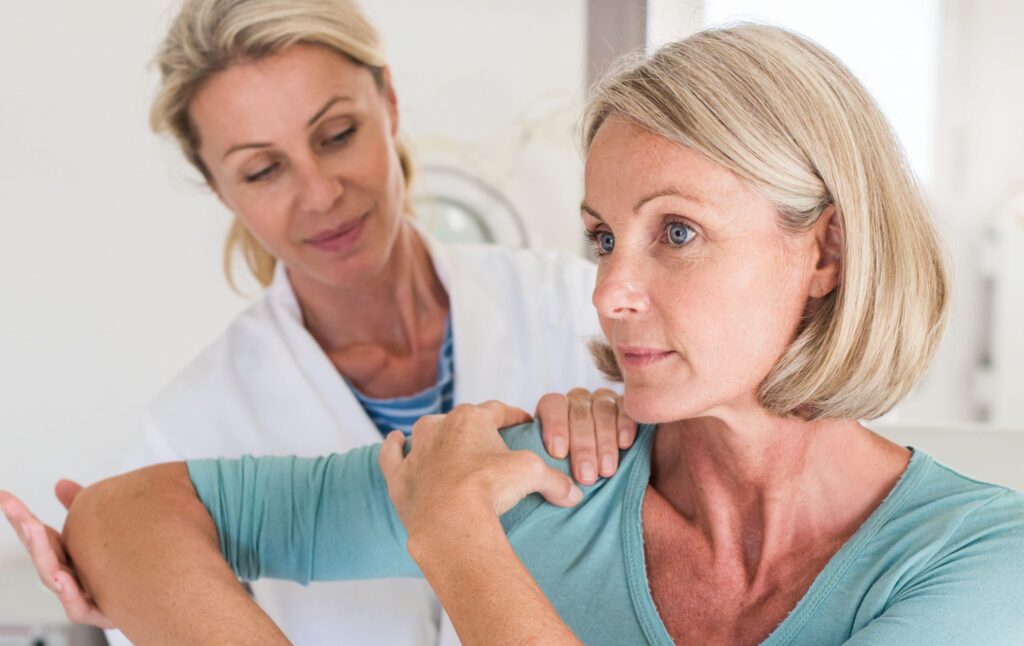When women get closer to menopause, it becomes even more important to prioritize bone health. Hormonal changes brought on by menopause can have a major effect on a woman’s bone density. It is imperative that you have a bone density test in order to take a proactive stance towards your health. Gynaecologists recommend getting this test to determine osteoporosis risk assessment during this transitional stage.
We’ll explore in this blog why this test is essential as menopause Bone health approaches and how it can significantly impact your general health maintenance.
Understanding Menopause and Its Impact on Bone Health
Hormonal changes accompany menopause, a normal stage of a woman’s life that includes a decrease in estrogen levels. Bone health is significantly impacted by this hormonal change. The risk of bone loss increases when estrogen levels fall, so it’s critical to detect and treat these changes early on.
How Does Menopause Bone Health Affect?
The decrease in estrogen levels that occurs as women approach menopause becomes a critical factor impacting bone health. A worrying tendency begins when bone density declines due to a decrease in estrogen. This decrease continues beyond menopause, increasing the chance of osteoporosis, which is a disorder where bones become weaker and less thick, making them more prone to breaking.
After menopause, the first five years are especially important since women can lose up to 10% of their bone mass on average. This stage is associated with a sharp decrease in bone mass, therefore it calls for increased awareness and prophylactic action. Even while the rate of bone loss slows down in the years that follow, the long-term effects are still a cause for concern.
Data indicates that over 50% of women over 60 will experience at least one fracture as a result of osteoporosis. This sobering fact highlights the pressing need for preventative measures like routine bone density testing, which is an essential instrument for early detection and treatment. Women can actively protect their bone health, lower their risk of fractures, and ensure a more robust skeletal foundation in the postmenopausal years by being aware of and taking action against this trajectory.
The Significance of Osteoporosis Risk Assessment
Osteoporosis, which is characterized by brittle and frail bones, progresses covertly and frequently shows no signs at all. Understanding that this process is silent emphasizes how crucial it is to take the initiative. It becomes clear that a bone density test is essential for quickly determining the risk. Osteoporosis can potentially negatively impair a person’s quality of life, although it can be substantially mitigated by prompt and tailored management based on early detection. By adopting this proactive strategy, people give themselves the capacity to make knowledgeable decisions, strengthening their skeletal health, reducing their chance of fractures, and maintaining a better quality of life in the face of this sneaky illness.
Reducing Your Risk of Osteoporosis
Leading a healthy lifestyle can lower your osteoporosis risk Assessment.
- Vitamin D and calcium
Try to consume 1,300 mg of calcium daily. This is the equivalent of three to four dairy servings (yogurt, for example). Almonds, Brazil nuts, dark green leafy vegetables, firm tofu, and fish with edible bones (like sardines) are additional excellent sources of calcium.
Verify that you get adequate vitamin D. Calcium absorption in the body is aided by vitamin D. It is produced in the skin after being exposed to the sun and is present in very trace amounts in some foods. An easy blood test can be used to determine vitamin D levels. Some persons might require supplemental vitamin D.
- Additional lifestyle modifications
Try to cut back on or cease:
- Consuming alcohol
- Consuming coffee
- Consuming smoke
- Exercise
Exercise is essential for preserving bone health. Additionally, it lowers the risk of fractures and falls while enhancing muscular strength, balance, and fitness. It is advised that you engage in physical activity for 30 to 40 minutes on most days of the week.
Exercises of certain kinds promote bone health. As an illustration:
- Workouts involving lifting weights (such as stair walking, skipping, jogging, tennis, and dance)
- Resistance training, or strength training (e.g., dumbbells, weight machines, push-ups, squats).
Before beginning, get guidance from a certified personal trainer, exercise physiologist, or physiotherapist.
9M Hospital- Your One-stop Solution for all Gynecologist Issues
Having a trustworthy ally is essential when it comes to women’s health, particularly throughout menopause. 9M Hospital is a unique one-stop solution for all gynecologist problems. They have a committed group of professionals who specialize in helping women navigate the complexities of hormonal shifts and associated health issues. 9m Hospital offers complete care customized to meet your individual needs, ranging from standard check-ups to specialized bone density Check-ups.
Making bone health a priority as you approach menopause is a proactive move that will benefit you in the long run. With the correct healthcare assistance and knowledge, navigating this stage of life is easier. A bone density test serves as a defence against potential bone-related issues in addition to being a diagnostic tool. When you work with professionals like 9M Hospital, you can go through with confidence, knowing that your menopause bone health is in good hands. Your bones will appreciate you for taking control of your well-being and embracing this new chapter with awareness.


